Schema.org on Bookster Websites
3 minute read // updated
Key Takeaways
- Bookster Websites use Schema.org markup
- Schema.org markup can be used to better describe your content
- Schema.org markup can boost visibility is Search and AI


we can identify Guest Reviews or Frequently Asked Questions.
What is Schema.org markup?
Schema.org markup is a shared vocabulary of code that you can add to a website's HTML. This structured data helps search engines like Google, Bing, and Yahoo! better understand the information on your pages. It was created as a collaborative effort by these search engines to create a common language for describing web content.
By implementing this markup on Bookster websites, we are explicitly telling search engines what the content is about. For example, we can identify Guest Reviews or Frequently Asked Questions.
Benefits of Schema.org markup
The main benefit is that search engines can use this information to create rich snippets or enhanced descriptions that appear in search results. These eye-catching results, which might show star ratings, prices, or event details directly on the search page, can significantly improve your site's visibility and click-through rate.
It will also assist Generative AI models to understand what your website content is about and present it in a better form to prospective guests.
Schema.org on Bookster websites
Examples of the Schema.org schemas that are used on Bookster Instant and Custom websites.
Vacation Rental
Used to identify a holiday rental property listing page and various elements that make up a holiday home (e.g. number of bedrooms etc.)
Reviews
Used to identify Guest Reviews (e.g. Guest Book Reviews) that are shown on our Bookster Websites.
Breadcrumb Lists
Used to identify where in the hierarchy of the website the current page sits.
e.g. Home -> Vacation Rentals -> The Beach House
Frequently Asked Questions
Used to identify a series of Questions and Answers. These are typically questions that a Guest has about a property.
Articles
Used on blog posts on Bookster Custom Website to clearly pick out author, published date, updated date etc. so that search engines and AI models can easily understand who wrote the post and how up to date it is.
Organization
Used to identify the holiday rental business that the website is representing.
Frequently Asked Questions
- How do I boost my website in AI (e.g. ChatGPT)?
- One way is to add schema.org markup to your website so that the AI crawlers and models can easily understand the content on your website.
- How do I see the schema.org markup?
- It is not typically visible when viewing a web page. You can see it in the HTML code (if you know what you are looking for) and certain schema types will show up in the Google Search Console.
- Why is my schema.org markup not showing in Google Search Console?
- Google does not show all schema.org schemas in the Search Console. It is unclear if they are using these schemas or not.
However, the markup is likely being used by AI crawlers.
Schema.org markup is an addition or extension of the semantic HTML that is used (to a lesser and greater extent) on the web.
It allows a website to communicate in more detail to website crawlers (of search engines and AI models) what is on the page and how it might be of interest to website visitors.

